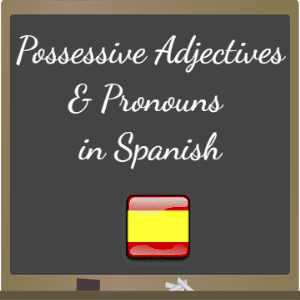In this lesson, we cover possessive adjectives and pronouns in Spanish. Possessive adjectives (my, your, his/her, our, their) come before a noun, e.g., “This is my house.” On the other hand, possessive pronouns (mine, yours, his/hers, ours, theirs) replace the noun and its possessive adjective, e.g., “This house is mine.”
In Spanish, possessive adjectives and pronouns must agree in gender and number with the noun they describe. Fortunately, only “nosotros/-as” and “vosotros/-as” have distinct masculine and feminine possessive adjective forms.
Possessive Adjectives in Spanish
The possessive adjectives in Spanish are:
| Singular | Plural | |
| my | mi | mis |
| your (informal singular) | tu | tus |
| his/her/your (formal singular) | su | sus |
| our | nuestro/-a | nuestros/-as |
| your (informal plural) | vuestro/-a | vuestros/-as |
| their/your (formal plural) | su | sus |
Note that, unlike in English, the possessive adjective agrees in number and gender with the noun it describes and not the subject, e.g., “mis hermanos” (my brothers). Note that we use “mis” because the noun we describe is plural, although the subject is singular. Similarly, in the example “nuestras madres” (our mothers), the possessive adjective “nuestras” agrees in gender and number with the noun it describes, i.e., “madres.”
Notice the lack of accent on the vowel in the possessive adjectives “mi” and “tu” to distinguish them from the prepositional object pronoun “mí” meaning “me,” and the subject pronoun for second-person singular informal “tú” meaning “you,” respectively. This is inconsequential in spoken Spanish and does not affect pronunciation.
The possessive adjective can come after the noun if we want to place the emphasis on the possessor. For example, “un amigo mío” (a friend of mine), “la casa tuya” (your house), etc.
Possessive Pronouns in Spanish
Let us now examine the possessive pronouns in Spanish. Unlike possessive adjectives, all possessive pronouns have masculine and feminine forms as well as singular and plural forms. One must use the correct form that agrees in gender and number with the noun.
Possessive pronouns are normally preceded with a definite article “el, la, los, or las” that agrees in gender and number with the possessive pronoun. For example, “Tu celular es mejor que el mío” (Your cell phone is better than mine), “Esa casa es la nuestra” (That house is ours).
The only exception is after the verb “ser,” where it is optional and can be dropped. For example, “No es tuyo, es mío” (It is not yours, it’s mine), “Esa casa es nuestra” (That house is ours).
In another special case, the possessive pronoun can be preceded by the neuter article “lo” to denote property. For example, “lo mío” (that which is mine), “lo nuestro” (that which is ours), “lo suyo/lo propio” (one’s own property), “lo ajeno” (that which belongs to others).
Quiz: Possessive Pronouns & Adjectives in Spanish
Next: Demonstrative Adjectives & Pronouns in Spanish
Other lessons in Level II:











